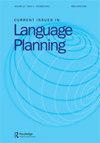日本高等教育中英语的新自由主义结构——运用伯恩斯坦的教学方法
IF 1.8
1区 文学
Q2 EDUCATION & EDUCATIONAL RESEARCH
引用次数: 1
摘要
摘要随着全球新自由主义的不断扎根,各国的目标是培养具有语言技能的人力资本,以在竞争激烈的市场条件下获得优势。鉴于这种关系,在表面上精英统治的知识经济中,英语水平构成了国家和个人层面成功的“合理”教育途径。然而,在日本,和许多其他地方一样,英语被指责强化了先前存在的权力关系。因此,本研究借鉴了伯恩斯坦的教学方法,解决了生产、再文本化和再生产等嵌套领域对教育实践的影响。关于生产,经合组织的规范性论述框架了基本的关键能力,支持一种有利于自由市场资本主义正统性的认识等级制度。与此同时,通过不平等的教学改革,监管话语的重新文本化将有价值的知识形式限制在参加著名大众市场机构的学习者身上。这反过来又对生殖产生了影响。通过承认和认识,英语作为一种“有效”知识的分类和框架使中产阶级家庭的学生享有特权。将英语作为全球沟通、商业和金融的“理性”联系点,从而有可能混淆决定其实践的社会经济秩序。本文章由计算机程序翻译,如有差异,请以英文原文为准。
The neoliberal structures of English in Japanese higher education: applying Bernstein’s pedagogic device
ABSTRACT As global neoliberalism continues to take root, States aim to produce linguistically-skilled human capital to gain an advantage within highly-competitive market conditions. With this relationship in view, English language proficiency constitutes a ‘rational’ educational pathway for national and personal-level success within an outwardly meritocratic knowledge economy. Yet, in Japan, as in many other locales, English has been accused of strengthening pre-existing power relations. Accordingly, this inquiry draws on Bernstein’s pedagogic device, to address the nested fields of production, recontextualisation, and reproduction shaping educational practice. Regarding production, normative OECD discourses framing essential key competencies favour an epistemic hierarchy privileging the orthodoxy of free-market capitalism. Through unequal pedagogic reform, meanwhile, the recontextualisation of regulatory discourse limits valued forms of knowledge to learners attending prestigious mass-market institutions. This, in turn, holds implications for reproduction. Through recognition and realisation, the classification and framing of English as a ‘valid’ knowledge privilege students from middle-class households. The appropriation of English as a ‘rational’ contact point for global communication, business, and finance thereby risks obfuscating the socio-economic order determining its practice.
求助全文
通过发布文献求助,成功后即可免费获取论文全文。
去求助
来源期刊

Current Issues in Language Planning
Multiple-
CiteScore
4.80
自引率
16.70%
发文量
26
期刊介绍:
The journal Current Issues in Language Planning provides major summative and thematic review studies spanning and focusing the disparate language policy and language planning literature related to: 1) polities and language planning and 2) issues in language planning. The journal publishes four issues per year, two on each subject area. The polity issues describe language policy and planning in various countries/regions/areas around the world, while the issues numbers are thematically based. The Current Issues in Language Planning does not normally accept individual studies falling outside this polity and thematic approach. Polity studies and thematic issues" papers in this journal may be self-nominated or invited contributions from acknowledged experts in the field.
 求助内容:
求助内容: 应助结果提醒方式:
应助结果提醒方式:


